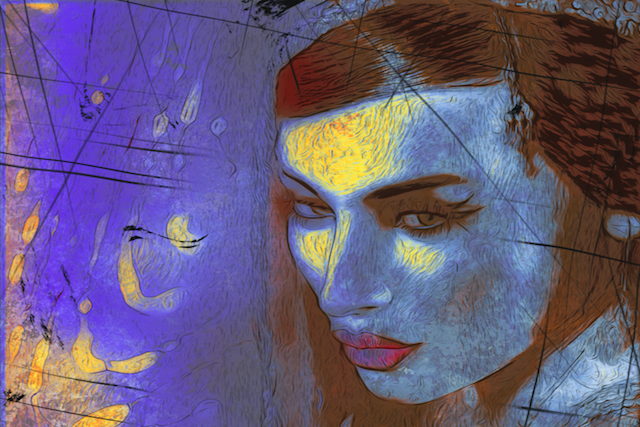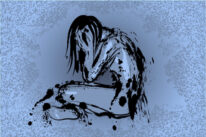
“The greatest glory in living lies not in never falling, but in rising every time we fall.” ~Nelson Mandela
It’s a cold winter day. As I plunge my hand down into the wax paper bag, I fully expect to find another bite or two. But, alas, there are only crumbs.
A distinct wave of sadness shoots through my heart. The chocolate scone is gone. And I don’t even remember eating it.
It is in this moment that I wake up. I quickly shake my head from side to side, as if rousing myself from a long night of troubled dreams.
What have I just done? What about the vow I’ve made to myself, again and again?
For years I have known that the best thing for my body’s healing process is to eat fresh, whole, organic foods (lots of leafy greens, fruits, and nuts!) and to avoid ingredients that overstimulate my endocrine and nervous systems, such as sugar and wheat flour.
And yet, today, here I am again. Eating some stupid, cheap scone I picked up on impulse at the local bakery. Full of who-knows-what ingredients.
Here I am again. Ignoring my own wisdom. Falling back into the food addiction that has plagued me since childhood.
Today I have lost control.
I pull my car over into a parking lot. (Yes, I have been mindlessly scarfing that darned scone while driving!) I take a deep breath.
Now is definitely the time for some self-love.
Addiction is a Dirty Band-Aid
Whether you struggle with a food addiction like I do or you deal with drug or alcohol addiction, every addiction is the same. An addiction is a loss of control over one’s behavior.
Our addictive behaviors don’t just randomly happen for no reason. They are a symptom of a deeper issue.
Why do we get addicted?
That scone or that cocktail or that cigarette brings about a temporary cessation of suffering. They block sadness, tension, fear, pain, boredom, and anger. They numb any and all negative emotions.
To put it simply, an addiction is a coping mechanism. It allows us to trudge onward in life, but without really looking toward the deeper issues.
An addiction may be a short-lived, temporary cure for the pain—but, as we all know, it’s not a long-term solution.
Running to our addiction is like slapping a Band-Aid on the wound—a Band-Aid that is dirty. Over time, the wound gets infected with the dirt and grime, and it worsens rather than heals.
The Addiction is Not the Problem
Here’s the thing about addiction, dear friends: The addiction is not really the problem. The addiction is the glaring symptom.
If we can look deeper than the symptom and see the situation from a holistic point of view, then we may begin to bring about a resolution to much of the suffering in our lives.
So, what is the deeper issue? What lies at the root of addiction?
Ultimately, all addiction—no matter the type or the severity—stems from a lack of connection. When we feel disconnected from other people, from our society, from our deepest hopes and dreams, and from a sense of love, then this disconnection brings about powerful emotions. These emotions hurt, and so we run to the seeming solace of the addiction.
The addiction may seem, on the surface, as if it’s the problem, but actually it’s not. The addiction is, in reality, a helpful pointer, showing us that there’s some internal healing we need to do.
The wonderful thing about addiction is that it is a powerful red STOP sign. It screams loudly: “Look! There’s a problem!”
Addictions help us get in touch with our inner self. Just like a cough helps us connect with the needs of our lungs (do I need fresh air? do I need more exercise? do I need to take certain herbs?), an addiction helps us get in touch with the needs of our heart.
Our heart is the seat of all emotion. Our heart is where feelings arise, are felt, and then released.
When we feel a lack of connection and love, we do not feel safe. We do not feel safe enough to explore the many emotions that can arise as a human being in our daily lives.
When we feel disconnected, negative emotions can feel overwhelming and scary. This is particularly true for those with abuse or trauma in their life history.
The addictive behavior is a misguided attempt to self-soothe. We believe that if we eat that scone or we drink that beer, then those scary emotions will stop and we will somehow be safe, somehow feel connected again.
But we all know that doesn’t work. What ends up happening is that, once the temporary high wears off, we are left feeling crappier than ever.
The addiction is not the problem. The problem, rather, is the false perception that there is no love, no connection.
Rising from Bottom
The cliché of the “rock bottom” is a cliché because it’s true. Most addicts eventually experience it.
Rock bottom looks different for everyone. It will have varying levels of intensity and consequences.
For some, the bottom is drastic: a suicide attempt, an illness, or a hospitalization. For some, it will simply be a very sad day when they realize that the time has come to change.
This time of rock bottom is the moment when we begin to wake up. It’s the time when the healing can truly begin.
For me, my rock bottom with food addiction came when my body had disintegrated nearly to the point of death.
I was on my perhaps my tenth round of antibiotics that year and having a severe allergic reaction to the medication. Delusional with a high fever, unable to lift myself from bed and barely able to call for help, I realized I probably would not live much longer if I did not change just about everything in my life. Shortly after, I began to explore the world of alternative medicine and began to clean up my diet.
We can think of this rock bottom—this intense realization that things need to shift—as the bottom of a spiral. This spiral begins at ground zero, and it moves upward through time.
As the days, weeks, and months pass, and we dedicate ourselves to a new way of being, we will have various challenges that arise. We will learn and grow and allow our emotions to be felt, rather than running from them. We will heal old wounds from childhood that have been lurking for many years.
Over time, with patience, we will be slowly shifting our perspective. We will become a new and better version. We will be moving from contracted perceptions of disconnection, lack, and fear, into expanded perspectives of connection, abundance, and love.
Through the adoption of various healing practices such as meditation, support groups, therapy, prayer, Reiki, or exercise, we come into greater harmony within ourselves. We learn to love ourselves.
Relapses and the Spiral of Evolution
In my struggle with addiction (not just with food, but with many other substances over the years), I have realized I am grateful to addiction. Addiction has played a very powerful role in my spiritual evolution.
Addiction is a powerful point of change. It is a journey inward. It the journey of becoming aware and conscious.
As we humans make this journey, and break the cycles of addiction, it’s so important to remember that change is not linear and it’s often not easy. Relapses happen.
The spiral analogy can be helpful. If we imagine that we are travelling upwards in consciousness, to greater and greater levels of joy, power, and self-awareness, then we can avoid traps of self-blame when we do occasionally relapse.
That day when I woke up to find scone crumbs on my lap was a challenging day indeed. I’d just had a disagreement with my roommate and was struggling with money issues. When I stopped at the bakery that day, intent on buying some tea, those scones whispered sweet love songs to me and I could not find the willpower to resist.
In that relapse, I temporarily lost sight of my own truth: That I want to avoid sugar and wheat flour in order to heal my body.
In that relapse, I was returning to the particular side of the spiral that was so known and comfortable: running to unhealthy food for comfort.
And yet, even though I had returned to that old familiar side of the spiral, I actually experienced this relapse from a greater height! In other words, in this relapse, I was able to more quickly move past it and get back to my own power.
It took just a few minutes and I forgave myself and moved into self-acceptance. I did not beat myself up.
In that cold car on that cold winter day, I placed my hands on my heart, and whispered some words of love and reassurance to myself. In the past, in the beginning of my healing journey with food, I might have added a cookie or a brownie on top of the scone, as a way to escape the terrible emotions of self-judgment and guilt. But—this time I didn’t!
Love Yourself and Heal
A relapse is nothing to be ashamed of. It happens.
If you or someone you love has been healing a pattern of addiction, please know that patience is key.
The spiral of evolution will bring you situations that will test your courage and self-awareness. Sometimes you will succumb. And that’s okay!
If you wake up and suddenly find yourself acting in a way that you know is not your highest good, then congratulate yourself for waking up. Take stock of your long-term changes and pat yourself on the back for coming this far.
Notice how you can more quickly bounce back from the relapse, with greater levels of patience and self-love. Notice how awesome you are!
Ultimately, the journey of addiction recovery is a journey of healing. And it’s a journey all humans go through, as we refine to greater and greater levels what it means to love and care for ourselves.
About Anya Light
Anya Light, PhD, is the author of Opening Love: Intentional Relationships & the Evolution of Consciousness. Her soul mission is to inspire people to greater and greater levels of self-love. Anya offers intuitive life coaching sessions at AnyaLight.com.













 Though I run this site, it is not mine. It's ours. It's not about me. It's about us. Your stories and your wisdom are just as meaningful as mine.
Though I run this site, it is not mine. It's ours. It's not about me. It's about us. Your stories and your wisdom are just as meaningful as mine. 